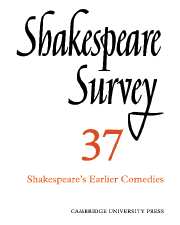Book contents
- Frontmatter
- Criticism of the Comedies up to The Merchant of Venice: 1953–82
- Plotting the Early Comedies: The Comedy of Errors, Love’s Labour’s Lost, The Two Gentlemen of Verona
- The Good Marriage of Katherine and Petruchio
- Shrewd and Kindly Farce
- Illustrations to A Midsummer Night’s Dream before 1920
- The Nature of Portia’s Victory: Turning to Men in The Merchant of Venice
- Nature’s Originals: Value in Shakespearian Pastoral
- 'Contrarieties agree': An Aspect of Dramatic Technique in Henry VI
- Falstaff’s Broken Voice
- ‘He who the sword of heaven will bear’: The Duke versus Angelo in Measure for Measure
- War and Sex in All’s Well That Ends Well
- Changing Places in Othello
- Prospero’s Lime Tree and the Pursuit of Vanitas
- Shakespearian Character Study to 1800
- How German is Shakespeare in Germany? Recent Trends in Criticism and Performance in West Germany
- Shakespeare Performances in Stratford upon–Avon–and London, 1982–3
- The Year's Contributions to Shakespearian Study 1 Critical Studies
- 2 Shakespeare’s Life, Times and Stage
- 3 Editions and Textual Studies
- Index
‘He who the sword of heaven will bear’: The Duke versus Angelo in Measure for Measure
Published online by Cambridge University Press: 28 March 2007
- Frontmatter
- Criticism of the Comedies up to The Merchant of Venice: 1953–82
- Plotting the Early Comedies: The Comedy of Errors, Love’s Labour’s Lost, The Two Gentlemen of Verona
- The Good Marriage of Katherine and Petruchio
- Shrewd and Kindly Farce
- Illustrations to A Midsummer Night’s Dream before 1920
- The Nature of Portia’s Victory: Turning to Men in The Merchant of Venice
- Nature’s Originals: Value in Shakespearian Pastoral
- 'Contrarieties agree': An Aspect of Dramatic Technique in Henry VI
- Falstaff’s Broken Voice
- ‘He who the sword of heaven will bear’: The Duke versus Angelo in Measure for Measure
- War and Sex in All’s Well That Ends Well
- Changing Places in Othello
- Prospero’s Lime Tree and the Pursuit of Vanitas
- Shakespearian Character Study to 1800
- How German is Shakespeare in Germany? Recent Trends in Criticism and Performance in West Germany
- Shakespeare Performances in Stratford upon–Avon–and London, 1982–3
- The Year's Contributions to Shakespearian Study 1 Critical Studies
- 2 Shakespeare’s Life, Times and Stage
- 3 Editions and Textual Studies
- Index
Summary
‘Law’, ‘Mercy’, and ‘Justice’ are three of the main concepts repeatedly used in Measure for Measure. There are no simple deductions to be made from this fact: the meaning of the play cannot be summed up as a kind of mathematical equation, Law plus Mercy equals Justice. The words themselves are not presented unambiguously. ‘Law’ is usually qualified by adjectives implying that Viennese law is harsh by its very nature – ‘strict statutes and most biting laws’ (1.3.19), ‘the hideous law’ (1.4.63), ‘the angry law’ (3.1.201) – but there is also a series of striking, sometimes faintly ludicrous, images suggesting that the law is despised and ineffective. Law is like ‘an o’er-grown lion in a cave / That goes not out to prey’ (1.3.22–3) or the ‘threatening twigs of birch’ (1.3.24) used to whip children; if not applied effectively it will be like the motionless scarecrow that the birds of prey regard as ‘Their perch, and not their terror’ (2.1.4), or will ‘Stand like the forfeits in a barber’s shop, / As much in mock as mark’ (5.1.319–20). The result is a paradoxical double image: the law can frequently be ignored with impunity, but may suddenly and unpredictably inflict savage punishment, with a kind of arbitrariness that is half accepted and half resented, as in the opening speeches of Claudio.
- Type
- Chapter
- Information
- Shakespeare Survey , pp. 89 - 98Publisher: Cambridge University PressPrint publication year: 1984
- 1
- Cited by



